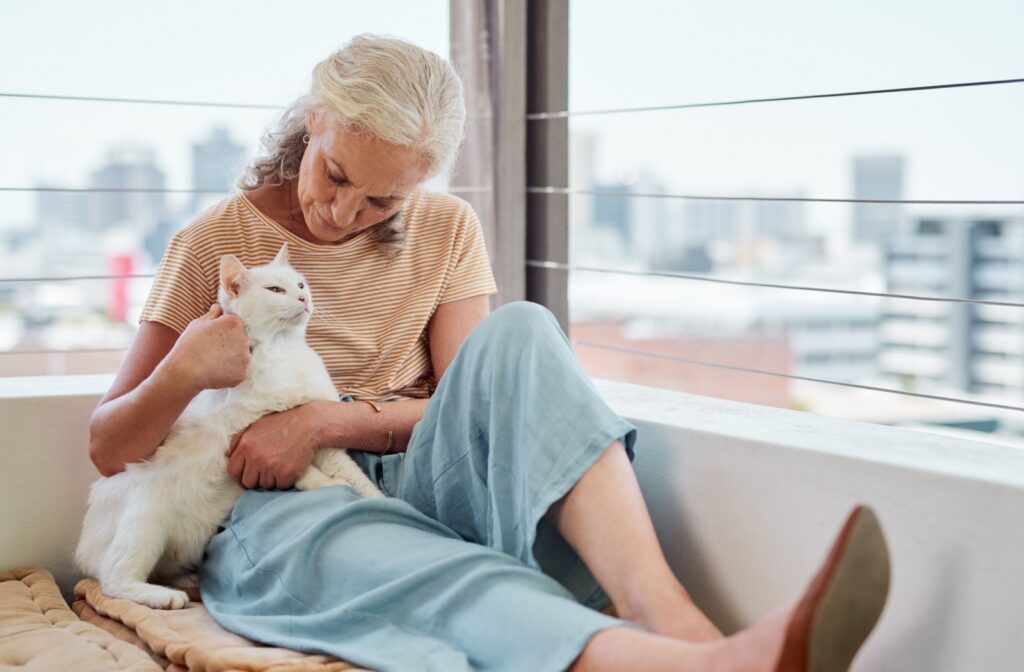As individuals transition to older adult living communities, the value of companionship in enhancing one’s well-being cannot be overstated. Pets offer not just companionship to older adults but can also bring a sense of responsibility and purpose to their lives.
However, helping an older loved one choose the right pet can be a challenge that involves thoughtful consideration about what will be a good fit for both the individual and their living space—especially for older adults who might already be enjoying the benefits of assisted living.
Dogs and cats are often considered ideal companions for older adults, but it’s worth exploring a variety of animals that could be just as easy to care for and suitable for specific communities.
At The Legacy at South Plains, we understand the bond between owner and pet, and we provide pet programs to help older adults and their furry friends enjoy all the comforts of our community.
Selecting the Ideal Pet for Older Adults
When selecting the ideal pet for older adults, several key factors need to be taken into account, especially for older adults in a senior living community.
Allergies
Over 50 million people in the US are affected by allergies, and 24 million people have asthma, so for many people, allergies are a critical factor to consider. While no dog is completely non-allergenic, certain breeds of dogs and cats are known for being hypoallergenic—less likely to cause a reaction—due to their minimal shedding.
For those with more severe allergies, considering pets like birds, reptiles, fish, or short-haired rodents might be advisable. Despite the challenges allergies may pose, they can often be managed with proper medical care and precautions.
Living Space Requirements
Different pets have varied space and environmental needs. Cats require areas to hide and perch, dogs need space for play and social interaction, birds benefit from spacious cages and toys, and small animals such as rabbits and hamsters enjoy environments that allow them to explore. Reptiles and fish each require specific habitats that mimic their natural surroundings.
Adapting your living area to suit the needs of your chosen pet can be essential for their well-being.
Compatibility with Your Lifestyle
Owning a pet offers numerous benefits for both your physical and mental well-being, but it also requires a significant level of responsibility. Making sure that your pet gets enough exercise, regular visits to the vet, proper training, and social interaction is important.
The type of pet that suits you best will largely depend on your lifestyle. For those who love the outdoors but are seldom at home, an energetic dog might be the ideal companion, as opposed to pets that require more care like reptiles, birds, or rabbits.
On the other hand, if you’re more of a homebody seeking a pet for companionship, you have a broader range of options. However, it’s important to consider the activity patterns of your potential pet, especially if you live in a smaller space or are sensitive to noise at night. Choosing a pet whose sleeping schedule aligns with yours could be beneficial for both of you.
Pet Age & Your Age
The age of the pet you’re considering is a significant factor in determining the level of care and commitment required. Puppies and kittens, while incredibly cute, often demand extensive attention and training. In contrast, an adult pet often requires less intensive care and might be the ideal companion you’re seeking.
It’s equally important to consider the pet’s lifespan. Being ready for a long-term commitment means accepting the emotional and financial responsibilities that come with caring for a pet through their older years and eventually having to say goodbye.
Adoption Processes
Meeting a pet beforehand can be crucial for gauging their personality and energy levels to make sure there’s a harmonious match between your lifestyles. Adopting from reputable sources like humane societies or rescue organizations not only helps you avoid supporting unethical breeding practices but also helps ensure that the pet has received proper care.
Financial Considerations
Pet ownership comes with its financial obligations, including regular veterinary care. Exploring options for veterinary assistance can be beneficial in managing these costs effectively.
Understanding Pet Policies in Your Community
Before bringing a pet into an older adult living setting, it’s important to familiarize yourself with your community’s pet policies, including any restrictions or additional fees that may apply. While some communities have specific rules regarding pets, emotional support and service animals are often protected by law in many places, allowing them to reside in places where pets might typically not be allowed.
Advantages of Pets for Older Adults
Owning a pet can bring numerous advantages, particularly for older adults, such as:
- Reduced feelings of isolation and boredom
- Increased physical activity and companionship
- Lower blood pressure levels
- Fewer symptoms of anxiety, depression, and discomfort
- Improved cardiovascular health
- Immune system support
- Enhanced social bonds

Choosing a Companion for Older Adults
In the end, the ideal pet for older adults depends on personal preference, capability, and housing conditions. Whether it’s a pet with fur, feathers, or scales, the appropriate animal can offer happiness, companionship, and a renewed sense of purpose during the later stages of life.
The Legacy at South Plains welcomes a variety of animals, recognizing the joy and fellowship they bring to our residents. We invite you to contact us for more information about our community and to determine if we align with your needs!


